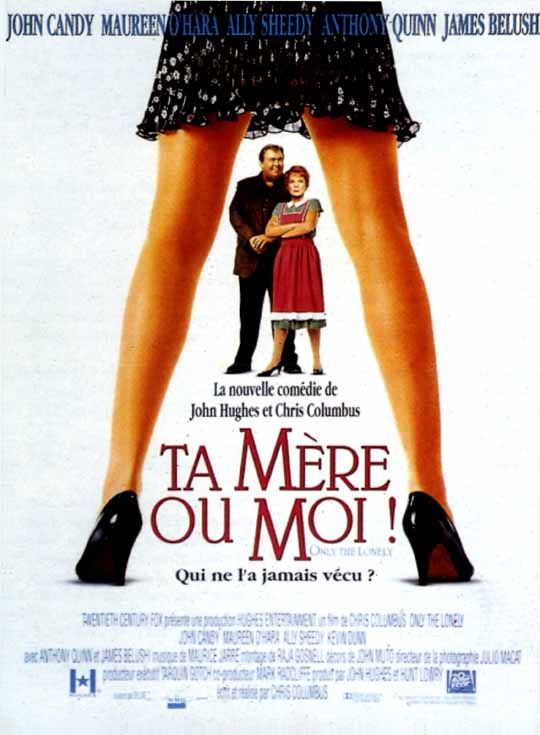Mothers Vs. Self: Understanding "Moi Ou Ta Mere" In A Modern Context
Ever wondered about the phrase "moi ou ta mère" and what it truly means? This iconic French expression has been around for ages, but its essence and cultural implications are more relevant today than ever before. It’s not just a phrase—it’s a deep dive into relationships, priorities, and sometimes, even family drama. So, buckle up, because we’re about to explore this topic like never before, breaking it down in a way that makes sense to everyone.
You might have heard "moi ou ta mère" in movies, music, or even in casual conversations. It’s one of those phrases that carries so much weight because it’s not just words; it’s an emotional statement. At its core, it’s about choosing between oneself and one's mother, which sounds dramatic, but trust me, it’s a conversation we’ve all had in some form or another.
Now, why does this matter? Well, understanding phrases like this helps us connect with cultures beyond our own. It opens doors to new perspectives and, most importantly, it gives us a chance to reflect on our own relationships. So, let’s dive in and unpack the layers of "moi ou ta mère" and why it’s such a big deal.
- Chinese Pregnancy Calendar 2024 Your Ultimate Guide To Predicting Babyrsquos Gender
- Discover The Charm Of Photos De Grand Buffet Chenocircve
What Does "Moi ou Ta Mere" Really Mean?
Let’s break it down. Literally, "moi ou ta mère" translates to "me or your mother." Sounds simple enough, right? But here’s the thing—it’s not always about the words themselves. It’s about the context, the emotions, and the power dynamics at play. This phrase often comes up in situations where someone feels like they’re being compared to or overshadowed by someone else, usually a parent.
Think about it: Have you ever felt like you’re competing for someone’s attention or affection? That’s essentially what this phrase captures. It’s a call-out, a challenge, and sometimes, even a cry for validation. It’s about asserting your place in someone’s life and reminding them that you matter too.
The Emotional Weight Behind the Words
When someone says "moi ou ta mère," they’re not just throwing out a random sentence. They’re expressing feelings of inadequacy, jealousy, or even fear of being replaced. It’s a raw, unfiltered look at the human condition, and that’s what makes it so powerful.
- Leg Curl The Ultimate Guide To Strengthening Your Hamstrings
- Unveiling The Magic Your Ultimate Guide To Animated Cartoons In 2000
Here’s the thing: relationships are complicated. Whether it’s romantic, platonic, or familial, there’s always a balance that needs to be maintained. And when that balance tips too far in one direction, phrases like "moi ou ta mère" become the tipping point.
Where Did "Moi ou Ta Mere" Come From?
Like most phrases, "moi ou ta mère" didn’t just pop out of thin air. It has roots in French culture, where family dynamics and relationships are often at the forefront of conversations. In France, the bond between mothers and children is particularly strong, and this phrase reflects that.
Historically, mothers have been seen as the pillars of the family, and their influence is undeniable. So, when someone says "moi ou ta mère," they’re essentially saying, "Am I important enough to compete with the most important person in your life?" It’s a bold move, but one that speaks volumes about the speaker’s insecurities and desires.
Cultural Context and Significance
In French culture, family is everything. It’s not uncommon for mothers to have a significant role in their children’s lives, even as they grow older. This phrase taps into that dynamic, highlighting the tension that can arise when someone feels like they’re being pushed aside.
But it’s not just about France. Cultures around the world have similar dynamics, where family loyalty and personal relationships collide. So, while "moi ou ta mère" might be a French phrase, its meaning resonates with people everywhere.
Why Does This Matter in Today's World?
In today’s fast-paced world, relationships are more complex than ever. With social media, dating apps, and constant communication, it’s easy to get caught up in the idea of perfection. But beneath all that, we’re still human, and we still struggle with the same emotions our ancestors did.
Take a moment to think about it: How often do you feel like you’re not enough? How often do you compare yourself to others, whether it’s a parent, a partner, or a friend? These are universal struggles, and "moi ou ta mère" gives us a lens through which to view them.
The Role of Social Media in Modern Relationships
Social media has changed the game when it comes to relationships. We’re constantly bombarded with images of perfect families, perfect relationships, and perfect lives. It’s no wonder that phrases like "moi ou ta mère" resonate so deeply with people today.
But here’s the thing: none of us are perfect. We all have moments of doubt, jealousy, and insecurity. And that’s okay. What matters is how we address those feelings and work through them. "Moi ou ta mère" reminds us to be honest with ourselves and with others, to communicate openly, and to prioritize the relationships that matter most.
Breaking Down the Psychology Behind the Phrase
So, why do people say "moi ou ta mère"? Is it just a dramatic way to express feelings, or is there something deeper going on? As it turns out, there’s a lot of psychology at play here.
When someone says this phrase, they’re often dealing with feelings of inadequacy or fear of abandonment. These are primal emotions that we all experience at some point in our lives. By saying "moi ou ta mère," the speaker is forcing the listener to make a choice, which can be both empowering and terrifying.
Understanding the Emotional Triggers
Emotions are tricky things. They can make us act in ways we don’t fully understand, and that’s especially true when it comes to relationships. Phrases like "moi ou ta mère" are often triggered by feelings of insecurity, jealousy, or even fear of loss.
But here’s the thing: these emotions don’t have to control us. By recognizing them and addressing them head-on, we can create healthier, more meaningful relationships. It’s about communication, understanding, and compromise.
How to Navigate "Moi ou Ta Mere" in Your Own Life
So, what do you do if someone says "moi ou ta mère" to you? Or, more importantly, how do you prevent it from happening in the first place? The key is communication. Open, honest, and respectful communication can go a long way in resolving conflicts and strengthening relationships.
Here are a few tips:
- Listen actively: When someone expresses feelings of inadequacy or jealousy, take the time to really listen to what they’re saying.
- Validate their emotions: Let them know that their feelings are valid and that you understand where they’re coming from.
- Set boundaries: It’s important to establish healthy boundaries in any relationship. This helps prevent misunderstandings and ensures that both parties feel respected.
- Communicate openly: Don’t be afraid to share your own feelings and concerns. The more open you are, the easier it is to build trust and understanding.
Building Stronger Relationships Through Communication
Communication is the foundation of any successful relationship. Whether it’s with a partner, a friend, or a family member, the ability to express yourself clearly and listen actively is crucial. When it comes to phrases like "moi ou ta mère," communication can be the key to resolving conflicts and strengthening bonds.
Remember, relationships are a two-way street. It’s not just about what you say, but how you say it. By approaching conversations with empathy and understanding, you can create a space where both parties feel heard and valued.
Real-Life Examples of "Moi ou Ta Mere"
To truly understand the impact of "moi ou ta mère," let’s look at some real-life examples. These stories highlight the complexities of relationships and the importance of communication in resolving conflicts.
Example 1: Imagine a couple where the partner feels like they’re constantly being compared to the other’s mother. They might feel like they’re not good enough, or that they’re always second-best. This can lead to resentment and tension in the relationship. By addressing these feelings openly and honestly, the couple can work through their issues and build a stronger connection.
Example 2: Consider a situation where a child feels like their parent is always prioritizing someone else over them. This can lead to feelings of neglect and insecurity. By talking about these feelings and finding ways to balance relationships, the family can create a more harmonious dynamic.
Learning from Real-Life Scenarios
These examples show us that "moi ou ta mère" isn’t just a phrase—it’s a reflection of the complexities of human relationships. By learning from these stories, we can gain a deeper understanding of how to navigate similar situations in our own lives.
Remember, every relationship is unique, and there’s no one-size-fits-all solution. What works for one couple or family might not work for another. The key is to approach each situation with empathy, understanding, and a willingness to communicate.
Conclusion: Embracing the Complexity of Relationships
In the end, "moi ou ta mère" is more than just a phrase—it’s a window into the complexities of human relationships. It reminds us to be honest with ourselves and with others, to communicate openly, and to prioritize the relationships that matter most.
So, what’s the takeaway? Relationships are complicated, but they’re also beautiful. By embracing the challenges and working through them together, we can create stronger, more meaningful connections. Whether it’s with a partner, a friend, or a family member, the key is communication, understanding, and compromise.
Now, it’s your turn. Share your thoughts, leave a comment, or check out some of our other articles on relationships and personal growth. Together, let’s navigate the complexities of life and build a better, more connected world.



Detail Author:
- Name : Emil Robel
- Username : ullrich.kasandra
- Email : karlie.olson@mante.com
- Birthdate : 1983-01-05
- Address : 317 Tillman Brook Apt. 617 Cronachester, WI 75659
- Phone : +1-360-341-1552
- Company : Simonis Group
- Job : Network Systems Analyst
- Bio : Est rerum ducimus quidem placeat rerum earum placeat sint. Sit tenetur qui est error sunt velit at repellat. Accusamus maiores minima eum temporibus rerum nam. Molestiae cumque rerum quis illo.
Socials
twitter:
- url : https://twitter.com/angelina4501
- username : angelina4501
- bio : Pariatur aut quidem aperiam et voluptatem. Voluptas sunt qui eum harum omnis. Mollitia enim et atque alias.
- followers : 6384
- following : 416
instagram:
- url : https://instagram.com/blanda2022
- username : blanda2022
- bio : Sequi magni cupiditate soluta aperiam quae. Laudantium at eligendi eligendi ipsa.
- followers : 251
- following : 1034
facebook:
- url : https://facebook.com/angelina_blanda
- username : angelina_blanda
- bio : Aut quia accusantium voluptas. Nulla aut nisi ut sed rerum minima atque.
- followers : 2385
- following : 373